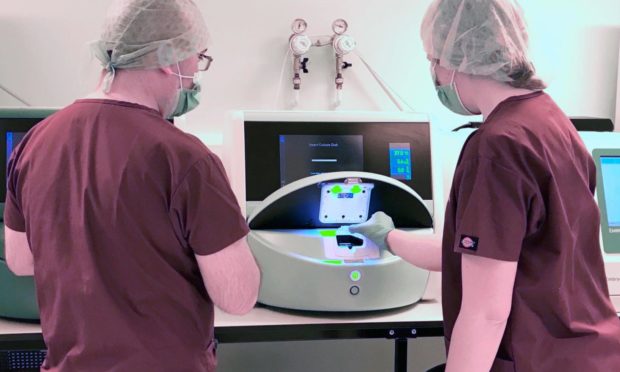Couples undertaking IVF treatments have received a huge boost in the form of new technology at Aberdeen University.
Through Scottish Government funding the Granite City institution has been able to acquire a new embryoscope.
Costing around £85,000, the new piece of kit uses artificial intelligence and allows teams to monitor the embryos progress in more detail.
The embryoscope allows monitoring – without disturbing the embryos – every ten minutes during five or six days that are crucial to success.
It is hoped that the new piece of equipment will be able to help ensure more people can have a baby through IVF treatments.
One of several techniques available to people with fertility problems, In vitro fertilisation (IVF) involves an egg being fertilised in a laboratory then returned to the womb.
More successful in younger patients, between 2014 and 2016 only 29% of women aged under 35 who underwent the treatments had a baby.
A figure that declines even further with age, over the same period women aged in their early to mid 40s only had a 2% success rate.
Laboratory manager, Dr Elizabeth Ferguson said: “When using conventional incubators, the embryos must be removed and monitored under a microscope to determine which are most likely to offer the best chance of pregnancy.
“But this method only gives us information from a single point in time so crucial developmental changes are sometimes missed.”
Specifically the new technology acquired by the university’s obstetrics and gynaecology department will take photos and use time lapse technology to give couples the best chance possible at conceiving a child.
She added: “This new equipment automatically takes images every 10 minutes for the duration of the embryo culture period, which is usually five or six days, and the images are compiled into time lapse videos.
“These videos enable our embryologists to monitor development in more detail and without disturbing the embryo, which helps us to identify the best quality embryos with the most potential.”
Assessing embryos in a more consistent way than other conventional methods, an inbuilt scoring system can determine the likelihood of a successful implant.
Deemed a “big step forward” by academics at the university, it is hoped the investment will help patients for years to come.
Dr Ferguson added: “Embryos should be replaced one at a time to reduce the risk of multiple pregnancies and we are now able to more confidently select the best embryos for transfer.
“This means that patients are more likely to achieve a pregnancy and in less time. The provision of NHS funding in Scotland is the best in the UK and it allows us to continuously improve the services we provide to our patients.”
